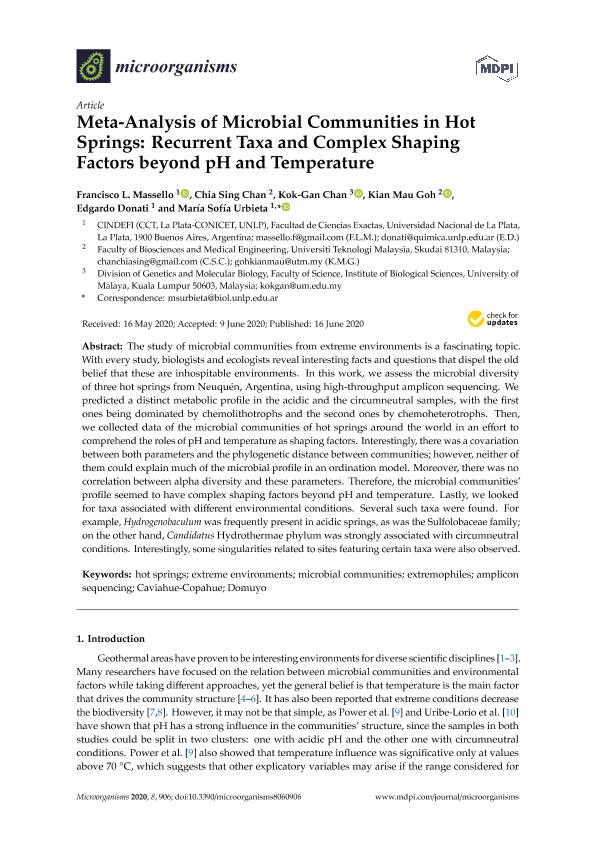Artículo
Meta-analysis of microbial communities in hot springs: Recurrent taxa and complex shaping factors beyond ph and temperature
Massello, Francisco Luis ; Chan, Chia Sing; Chan, Kok Gan; Goh, Kian Mau; Donati, Edgardo Ruben
; Chan, Chia Sing; Chan, Kok Gan; Goh, Kian Mau; Donati, Edgardo Ruben ; Urbieta, María Sofía
; Urbieta, María Sofía
 ; Chan, Chia Sing; Chan, Kok Gan; Goh, Kian Mau; Donati, Edgardo Ruben
; Chan, Chia Sing; Chan, Kok Gan; Goh, Kian Mau; Donati, Edgardo Ruben ; Urbieta, María Sofía
; Urbieta, María Sofía
Fecha de publicación:
16/06/2020
Editorial:
MDPI AG
Revista:
Microorganisms
ISSN:
2076-2607
Idioma:
Inglés
Tipo de recurso:
Artículo publicado
Clasificación temática:
Resumen
The study of microbial communities from extreme environments is a fascinating topic. With every study, biologists and ecologists reveal interesting facts and questions that dispel the old belief that these are inhospitable environments. In this work, we assess the microbial diversity of three hot springs from Neuquén, Argentina, using high-throughput amplicon sequencing. We predicted a distinct metabolic profile in the acidic and the circumneutral samples, with the first ones being dominated by chemolithotrophs and the second ones by chemoheterotrophs. Then, we collected data of the microbial communities of hot springs around the world in an effort to comprehend the roles of pH and temperature as shaping factors. Interestingly, there was a covariation between both parameters and the phylogenetic distance between communities; however, neither of them could explain much of the microbial profile in an ordination model. Moreover, there was no correlation between alpha diversity and these parameters. Therefore, the microbial communities’ profile seemed to have complex shaping factors beyond pH and temperature. Lastly, we looked for taxa associated with different environmental conditions. Several such taxa were found. For example, Hydrogenobaculum was frequently present in acidic springs, as was the Sulfolobaceae family; on the other hand, Candidatus Hydrothermae phylum was strongly associated with circumneutral conditions. Interestingly, some singularities related to sites featuring certain taxa were also observed.
Archivos asociados
Licencia
Identificadores
Colecciones
Articulos(CINDEFI)
Articulos de CENT.DE INV EN FERMENTACIONES INDUSTRIALES (I)
Articulos de CENT.DE INV EN FERMENTACIONES INDUSTRIALES (I)
Citación
Massello, Francisco Luis; Chan, Chia Sing; Chan, Kok Gan; Goh, Kian Mau; Donati, Edgardo Ruben; et al.; Meta-analysis of microbial communities in hot springs: Recurrent taxa and complex shaping factors beyond ph and temperature; MDPI AG; Microorganisms; 8; 6; 16-6-2020; 1-18
Compartir
Altmétricas



